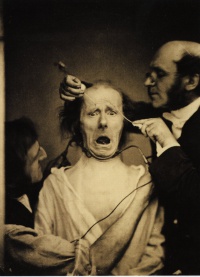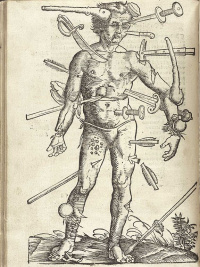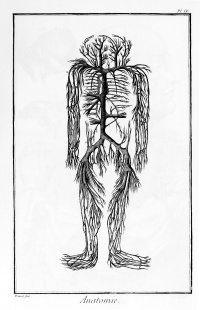Medicine
From The Art and Popular Culture Encyclopedia
|
"I felt a little ill and called Dr. Symmachus. "Possibly, indeed, it was the anomalous that was largely instrumental in arousing in the savage the attention, thought, and investigation that were finally to develop into the body of organized truth which we now call Science."--Anomalies and Curiosities of Medicine (1896) by George M. Gould and Walter Lytle Pyle |

The image depicts the mechanics of facial expression while Duchenne and an assistant faradize the mimetic muscles of "The Old Man"
|
Related e |
|
Featured: |
Medicine is the applied science or practice of the diagnosis, treatment, and prevention of disease. It encompasses a variety of health care practices evolved to maintain and restore health by the prevention and treatment of illness in human beings.
The word medicine is derived from the Latin ars medicina, meaning the art of healing.
History
The ancient Egyptians had a system of medicine that was very advanced for its time and influenced later medical traditions. The Egyptians and Babylonians both introduced the concepts of diagnosis, prognosis, and medical examination. The Greeks went even further, and advanced as well medical ethics. The Hippocratic Oath, still taken by doctors today, was written in Greece in the 5th century BCE. In the medieval era, surgical practices inherited from the ancient masters were improved and then systematized in Rogerius's The Practice of Surgery. Universities began systematic training of physicians around the years 1220 in Italy. During the Renaissance, understanding of anatomy improved, and the microscope was invented. The germ theory of disease in the 19th century led to cures for many infectious diseases. Military doctors advanced the methods of trauma treatment and surgery. Public health measures were developed especially in the 19th century as the rapid growth of cities required systematic sanitary measures. Advanced research centers opened in the early 20th century, often connected with major hospitals. The mid-20th century was characterized by new biological treatments, such as antibiotics. These advancements, along with developments in chemistry, genetics, and lab technology (such as the x-ray) led to modern medicine. Medicine was heavily professionalized in the 20th century, and new careers opened to women as nurses (from the 1870s) and as physicians (especially after 1970). The 21st century is characterized by very advanced research involving numerous fields of science.
See also
- History of medicine
- Disease
- Medical illustration
- Medical museum
- Medicine show
- Medicalization
- Anatomy
- Psychiatry
See also
- Medical encyclopedia
- Pill
- Surgery
- Neurosurgery
- Otolaryngology
- Transplant surgery
- Urology
- Allergy / Immunology
- Endocrinology
- Infectious disease
- Obstetrics and gynaecology
- Gynaecology
- Pathology
- Anesthesiology
- General practice
- Neurology
- Pain management
- Pediatrics
- Psychiatry
- Sexual medicine
- Physician
- Dentistry
- Veterinary medicine
- History of medicine
- Painting showing spasms in a patient suffering from tetanus (1809) by Charles Bell





